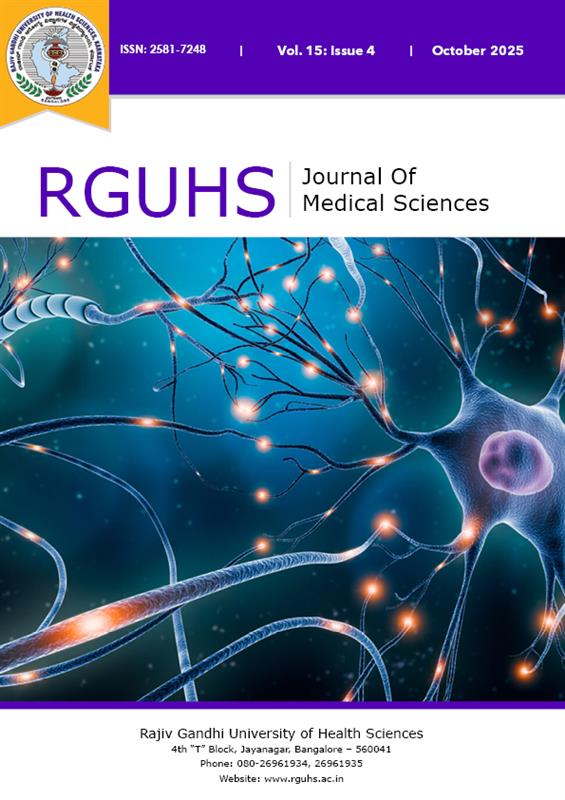
RGUHS Nat. J. Pub. Heal. Sci Vol: 15 Issue: 4 eISSN: pISSN
Dear Authors,
We invite you to watch this comprehensive video guide on the process of submitting your article online. This video will provide you with step-by-step instructions to ensure a smooth and successful submission.
Thank you for your attention and cooperation.
Ashok DS
Ear, Nose and Throat Surgeon, Shree Shyla Clinic, Basaveswarnagar, Sparsh Hospital, Yeshwanthpur & Citi Hospital, Rajajinagar, Bengaluru.
Corresponding author:
Dr. D S, Ashok Shree Shyla Clinic, ‘Kanva Shree Sai Complex’ , 861, Modi Hosp Circle, West of Chord Road, Bangalore 560 086. E-mail: ashokds@yahoo.com.

Abstract
None
Keywords
Downloads
-
1FullTextPDF
Article
Code of Morals
Ethics is defined as a Moral philosophy or Code of morals practiced by a person or group of people. An example is the code of conduct set by a business or profession. The Medical profession has its own Code of Ethics, and has been prescribed both in words, for eg. as in The Hippocratic Oath, The Declaration of Helsinki(1), etc., as well as through oral teachings passed through generations. The code of ethics for a physician is not much different from that of a common man or other profession except in that Medical professionals are held to a high standard and are expected to adhere to medical ethics in order to avoid any confusion, conflict or ambiguity when it involves dealing with patients or with fellow doctors.
Ethical Issues
While most ethical issues can be plain and crystal clear, there could be occasions when you, as a medical professional, get into a scenario that’s paradoxical and a dilemma in nature when viewed from the ethical perspective. For instance, if you have to decide between two courses of action, each of which seems to be appropriate but which contradict each other and lead to a mutually exclusive, irrevocable choice, it is necessary to walk a step back and take a practical view of the choices before deciding on the best or better course of the action as a next step. There could be a number of instances when you would have to think carefully and take the most ideal path depending on the situation.
Though technically the code of ethics has changed mutationally over the last many decades in tune with the changing moral principles the basic values that a doctor has to abide by are:
a. That the patient is at the apex of our medical practice.
b. The Patient should have the fundamental right or the prerogative to decide his or her health care.
c. Treating every patient with respect and dignity, irrespective of their financial status.
d. Doing whatever is beneficial to the patient, with no other ulterior motive interfering in the thought process.
e. Taking due diligence to ensure that the patient does not suffer due to bad diagnosis or treatment.
It’s worthwhile noting that while the above mentioned points are a guidance, a directive to medical ethics, they are not all-encompassing. It’s critically necessary for the medical professional to be forthcoming with the patient, give an honest feedback, and conform to respect for the patients and their families.
Unethical practices
It is worth mentioning those practices that can be termed unethical:
- Refusing or compromising on treatment given to a patient due to the hospital’s financial ceiling, or due to insurance limitations.
- Accepting bribes or kickbacks from certain pharmaceutical companies to favour them over others.
- Aggradising or exaggerating the illness so as to extract more money from the patient.
- Not admitting to an error in treatment.
- Having an inappropriate, romantic affair with a patient or her relatives.
- Choosing patients through racial, sexual, or monetary bias.
- Adhering to mere baseline, minimal medical practices and not doing in-depth treatment in order to avoid malpractice lawsuits.
- Divulging a patient’s medical information to persons who should not be in the knowhow, or who are acting against the patient’s interests.
Holistic view While most of the discussion until now has involved mentality and thinking on part of the medical professional, it is also necessary for the one giving the treatment to exhibit and apply the necessary practical skills, getting a holistic view of the patient’s medical history and treatments, and implementing one’s perspective such that it best serves the interests of all parties involved. “The doctor of the future will give no medicine but will interest his patients in the care of the human frame, in diet and in the cause and prevention of disease”...Thomas Edison2 .
Practical effects of Medical Ethics:
At the heart of medical ethics lie some ethos that can have practical implications or consequences:
a. Helping resolve disputes between families, patients, doctors and other personnel involved. Take emotion out of the equation.
b. Maintaining a clear conscience... Do absolutely what is right and appropriate, and there would be no guilty feelings.
c. Show you are in control. Spend time taking decisions, and do not resort to knee-jerk course of actions.
d. Maintain the patient’s trust. Ensure that it is never breached or broken, and that the patient shows complete faith in the doctor’s ability.
e. Maintain trust with other doctors. Especially when it comes to deciding on concurring on a specific treatment for a patient.
f. Practice effective time-management and efficiency so that the patient gets the best value from a medical standpoint.
g. Do not take on more patients than you can handle so as to reduce burnout and increase individual patient care.
Supporting File
References
- Wikipediaorg. Wikipediaorg. [Online]. Available from: https://en.wikipedia.org/ wiki/Declaration_of_Helsinki [Accessed 12 September 2019].
- Informedmeateatercom. Informedmeateater com. [Online]. Available from: http:// www.informedmeateater.com/wp-content/ uploads/2013/10/thomas-edison-doctorquote.jpg [Accessed 12 September 2019].